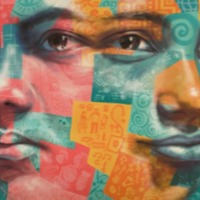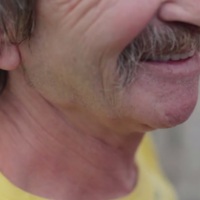
I came here today as a woman, a Khmer woman. I came here today to tell you my story, in the hope that after you listen to me you can understand my situation and the situation of thousands of Khmer women and other women around the world. It is very difficult for me to come here and speak to you; but I am doing this because I want you to listen, to me the real person; and I want you to remember me and what I say to you today when you are in your offices talking about policies and strategies that affect me and my sisters. I want you to remember we are not “problems” we are not animals, we are not viruses, we are not garbage. We are flesh, skin and bones, we have a heart, and we have feelings, we are a sister to someone, a daughter, a granddaughter. We are people, we are women and we want to be treated with respect, dignity and we want rights like the rest of you enjoy.
I was trafficked, I was raped, beaten, and forced to accept men. I was humiliated and forced to be an object so men, yes men, could take their pleasure, I brought profit to many and brought pleasure to others. And for myself I brought shame, pain and humiliation. But worst of all I receive demeaning comments from you: you discriminate against me, you give yourselves a job because of me and you are busy thinking about the best way to protect the community from me.
The police come to Toul Kork almost every day. They always have a reason to come, but they come more frequently before festivals like Pchum Ben, because we are an easy target to extract money from. In a public forum the chief of these police stands up and states, “We do not arrest the girls”: lies and more lies. They arrest us and take our money, our jewelry, sometimes even our few possessions we have in our room like our bed covers. If we cannot pay then they detain us for a day or two, they give us no water. When they are convinced we simply have no money to pay they take us to another brothel and sell us to a newpimp, usually for $100 for one girl. Then we become indebted once again and have to pay off that debt to the new pimp.
This is trafficking. The police, yes, the police sell us for another cycle of slavery. Do you think it is in their interests to see my occupation decriminalized? Of course not: then they lose their share of the money. In one day we pay almost 15,000 riel [$3] in bribes to the district police, to the municipal authorities and the local authorities. Then another group of police come and arrest us. If we do not run and hide we are re-sold to slavery. Your solution is to ask these people to protect us. Think again. They live off our blood. Money is too important to everyone, money and more money. It is not enough to eat: people demand more because they want nice things.
I come from a poor family; they sent me to study at a cultural school in Phnom Penh. I was living with a family but I could not contribute to my living, so they helped me find a job in a nearby hotel washing dishes. This hotel had many sex workers. But I just washed dishes and went to school. One night a man followed me when I was on my way home and raped me. I was only 17 years of age. You cannot imagine how I felt and what impact this had on me. But after that, I was lured to becoming a sex worker under false promises. I was sent to Stung Treng; I was beaten when I refused to accept men. Shortly after I was taken to Stung Treng a man came to pay for me to go with him. He paid my maebon.
He took me to the pig slaughter house where he worked and locked me in a dirty smelly cell. Then he came back with six other men. They all, one by one, raped me; one man raped me twice. After a whole night of gang rape I was faint with pain. When the morning came I heard the workers preparing to start their work. I heard the pigs being pushed into the pens, they were screaming. I knew what that feeling was like: I was no better than the pigs to these men; they could have killed me. Something inside me did die, and I will never be the same. I am 24 years old and my life has been like this since 1993. I did not know the Khmer Rouge years but I have heard the stories of suffering. People say they were slaves.
Compared to my life for the last five years I think I and my sisters have suffered and are suffering more than you have. I know starvation, I know slavery, I know being forced to work all day. But I also know physical violation and torture every day, I know discrimination and hatred from my country-people, I know not being wanted and accepted from my society, the society that put me in this condition. I know fear, I feel it every day, even now that I dare speak my life is in danger.
This is a crime, but no one is punished. I fought the Khmer Rouge, I was a soldier fighting to protect you from the Khmer Rouge and risking my life. I fought for the freedom of the Cambodian people, this is what the commander told us we were to do and I was proud I was fighting for freedom. I fought for your freedom—only to become enslaved and abused by you.
After all these years I now work as a sex worker. I also run a union to unite sex workers to fight for basic rights and for freedom. We bring our voices to forums like this to educate people like you, with the hope you can learn from us. Many of my sisters are scared to join our struggle because they live in constant fear of abuse and threats.
Some of you think that I am bad because I choose to remain a sex worker. My answer to those people is: I think your society, my society, my motherland Cambodia, is bad because it does not give girls like me choices; choices that I see are better for me. I think it is bad that my country allows men to rape young women like me and my sisters and go unpunished. I think it is bad that my society lets men seek and demand the services of women like me. I think it is criminal that we are enslaved to make money for the powerful. I think it is bad that my family are so poor and getting poorer because they can not survive as farmers with little resources which are getting smaller because more powerful people move them off their land. I think it is bad the police treat me and my sisters like we are criminals but those who exploit us and take our dignity, our money and sometimes our lives live in freedom, enjoying their lives with their families. Because why? Because they have a powerful relative, because they have money.
Is this right? Is this justice? My sisters and I we do not create the demand, we are the objects; the demand comes from the men, the men come to us. We are cheated, deceived, trafficked, humiliated and tortured. Why? Because men want us and we bring money to the powerful. But we are the powerless.
You give us AIDS; when we are no longer profitable you leave us to die, but we do not die in peace: you point your finger and you blame us. You, the development organizations, give us condoms and teach us all the time about AIDS. We do not want your words, we do not want your judgment, we do not want you to tell us what is better for us. We know about AIDS; we watch our sisters die from the disease. Ask us if we have the power to demand condom use from our clients. Look at me: you see a woman, but my boss sees dollars. An extra payment to my boss and the client does not wear a condom. If I protest I receive a beating. If I die tomorrow no one cares: there are many other girls who will be tricked and trafficked like me, because we feed many people.
I do not want to go to your shelter and learn to sew so you can get me work in a factory. This is not what I want. If I tell you that you will call me a prostitute. But those words are easy for you because you have easy solutions to difficult problems you do not understand, and you do not understand because you do not listen.
My life has become this way now; for me there is no turning back, so let me continue to practice my occupation, but recognize my occupation and give me my rights, so I am protected and I can have power to demand justice.
I am a post Khmer Rouge child
But was a slave
I was forced to work against my choice
My body is tortured
I am full of pain
I am not a citizen
I am not a person
You see me as a virus
I am invisible
Your eyes do not see me
You hate me
You blame me
Some of you pity me
I do not want your pity
Narrative as told to participants at the First National Conference on Gender and Development, September 7, 1999, in Phnom Penh, Cambodia.
